This Daejeon travel guide shows you the highlights of this modern metropolis with its slew of fun things to see and do. Science and innovation characterise the “Silicon Valley of South Korea”, while family-friendly attractions keep the little ones entertained. And despite being the country’s 5th largest city, Daejeon retains a close connection to the natural world. Its leafy inner-city parks, gurgling hot springs, and scenic alpine reserves are ideal for a quick nature escape.
Daejeon has a true 4-season climate, with hot, humid summers and sub-zero winters. Its inner-city parks and nearby nature reserves look stunning in autumn, when the foliage transforms into vibrant ochre hues. Likewise, spring is a brilliant time to see the cherry blossoms bloom. The monsoon season runs from July to September. Whether you’re in town on a day trip or want to explore the city more thoroughly, you’ll find plenty to see and do in Daejeon. We’re covering the main highlights and essential travel info so you can make the most of your visit.
Daejeon technology
A paradise for science and technology buffs

- Οικογένειες
- Φωτογραφία
Daejeon is the epicentre of South Korean innovation, and this high-tech city has a multitude of modern attractions. The central tech hub is Daejeon Expo Science Park, home to cutting-edge landmarks and museums. Don’t miss the world-renowned National Science Museum, the Hanbit Tower observation deck, or the iconic Expo Bridge, which glimmers in multicoloured neon once the sun goes down. To the west, the KIGAM Geological Museum is a small family-friendly space full of dinosaur bones and prehistoric fossils.
Daejeon earned its reputation as a high-tech, forward-thinking city during Expo ’93. The 3-month international exhibition showcased South Korea’s technological prowess and commitment to sustainable development. Daejeon Expo Science Park opened a year later to commemorate the historic event.
Daejeon nature
A close connection to the natural world

- Περιπέτεια
- Οικονομική διαμονή
- Οικογένειες
- Φωτογραφία
To reacquaint yourself with nature, head to the Hanbat Arboretum. This thickly forested urban parkland is ram-packed with pristine ponds and blooming gardens, perfect for a stroll.
To the east, Gyejoksan Mountain has a scenic 15 km hiking trail affording breathtaking city views. Most locals tackle the route barefoot as the soft red clay is said to be good for your health. South of town, the Jangtaesan Recreational Forest has elevated walkways amid towering metasequoia trees. Afterwards, visit the Yuseong Hot Spring to soak those trail-worn feet.
Δείτε επίσης
- Daejeon Travel Essentials

Daejeon Travel Essentials
South Korea - 5 Great Restaurants in Daejeon

5 Great Restaurants in Daejeon
South Korea - 5 Best Things to Do in Daejeon on a Small Budget

5 Best Things to Do in Daejeon on a Small Budget
South Korea
Gungdong Rodeo Street
A popular, budget-friendly spot to eat and drink

- Φαγητό
- Νυχτερινή ζωή
Gungdong Rodeo Street is the city’s premier dining hub. Located near the KAIST University, the neon-lit strip attracts a steady stream of students who feast in its dizzying array of restaurants and cafés. Travellers coming from Seoul may be reminded of Itaewon, the capital’s main tourist and expatriate enclave.
The youthful demographic keeps prices low, making it an enticing dining option for shoestring travellers. Once you’ve filled up on tasty Korean or Chinese fare, you’ll find a plethora of boutique shops to peruse. Fancy a tipple? The Ranch Pub does hoppy craft brews.
ΧάρτηςDaejeon O-World
A family-friendly theme park

- Οικογένειες
The little ones will adore Daejeon O-World, a sprawling amusement park with several thematic sections to explore. As the biggest theme park in central South Korea, the 682,830-square-metre plot takes a full day to day to explore (allow half a day for the highlights). If possible, time your visit in spring when the cherry blossoms add even more colour to the pastel-hued Flower Land.
Joy Land has a vast selection of adrenaline-pumping rides, from rollercoasters to water slides and the terrifying Giant Drop. Should you fancy stretching your legs, there’s a scenic 5.5-km hiking trail snaking through a 30-hectare forest. Scheduled kid-friendly performances take place at the Rainbow Stage.
Τοποθεσία: 70 Sajeonggongwon-ro, Jung-gu, Daejeon, South Korea
Ώρες λειτουργίας: Daily from 9.30 am to 8 pm
Τηλέφωνο: +82 (0)42-580-4820
ΧάρτηςDaejeon dining and restaurants
Daejeon is a great place to savour local Korean cuisine

- Φαγητό
While Daejeon can’t match the culinary scene in Seoul, you’ll find a selection of superb eateries scattered around the city. To sample the local cuisine, make a beeline for Seonhwa-dong Speciality Food Street. This authentic, 40-year-old dining district does all the best Daejeon delicacies, from Korean bouillabaisse to stir-fried tofu.
Daeheung-dong Noodle Soup Alley is your best bet for a steamy bowl of kalguksu (Korean-style noodle soup). The hearty dish became a local staple when Daejeon Station was a flour distribution centre for US Aid. If you fancy adding surf clams to your wheat flour noodles, pop into Oh-ssi Kalguksu. Or, if spicy noodles with cockles tempt the palate, give Jogijong-ui Hyangmigak a go.
Shopping in Daejeon
Options for retail therapy abound in Daejeon

- Καταναλωτές
The lively Daejeon Sky Road is the city’s premier shopping strip. Smothered in large LCD screens, the futuristic Times Square-like street becomes a neon-lit wonderland at night. Hit Jungang Market to browse a bewildering collection of foodstuffs and household wares. This enormous, semi-enclosed market stocks the usual international brands plus second-hand goods.
Hyundai Premium Outlet Daejeon is the largest shopping mall in town, boasting a vast ensemble of fashion outlets and homeware stores. Another massive modern mall is Expo Core, where you’ll find cosmetics, electronics, and more.
φωτογραφία από travel oriented (CC BY-SA 2.0) τροποποιήθηκε
Nightlife in Daejeon
Daejeon comes alive after dark

- Νυχτερινή ζωή
Daejeon has decent nightlife for a city of its size – and it’s not all about late-night drinking either. Dunsan-dong, or the “new” downtown, has a string of happening watering holes and western-style dance clubs. Yuseong is your best bet for a bar crawl. Try J Rock or Watermelon Sugar if you want to hang out with the expat English-teaching crowd.
It’s worth wandering across the Mokcheokgyo Bridge, a brightly-lit structure spanning the Daejeon River. You could also hike up an easy trail to the Bomunsan Observatory to enjoy sweeping views of the cityscape.
Activities in Daejeon
Pretty hiking trails traverse the city’s outlying hills

- Περιπέτεια
- Οικονομική διαμονή
The 14.5-km Gyejoksan Red Clay Trail is Daejeon’s premier barefoot walking route. Stash your shoes in your backpack and let the soft clay and pine needles massage your feet. For sweeping city views, hit the 8-km Mt. Sikjangsan Forest Trail or climb to the Bomunsan Observatory. The Jangtaesan Recreational Forest is a great place to meander among metasequoia and Ginko trees.
Ppuri Park is one of the most family-friendly open spaces for its intriguing sculptures and easy walking trails. Visit the UAM Historical Park for a taste of old-world Korea or the Daedong Sky Park for a photo-op with its iconic embossed windmill.
How to get to Daejeon
Daejeon serves as a key South Korean transport hub

As the crossroads of the national road and rail network, Daejeon is an easy pit stop for travellers traversing the country. Most domestic railway services stop at Daejeon Station. Buses leave from the Daejeon Express Bus Terminal or the Daejeon Terminal Complex. Chongju Airport is the closest aviation hub – it’s 42 km from downtown.
A clean, efficient, and affordable subway network connects large swathes of the city. The bus system is more extensive, though slow and difficult to navigate for non-Korean speakers. Taxis and rideshares are ubiquitous but pricey over long distances.
φωτογραφία από *Youngjin (CC BY-SA 3.0) τροποποιήθηκε

Το άρθρο αυτό περιλαμβάνει απόψεις της συντακτικής ομάδας Go Guides Η Hotels.com αποζημιώνει τους συντάκτες για τα κείμενά τους που εμφανίζονται στην ιστοσελίδα αυτή. Μια τέτοια αποζημίωση ενδέχεται να περιλαμβάνει ταξίδια και άλλα έξοδα.
Ξεκινήστε να οργανώνετε το ταξίδι σας
Πού να μείνετε: Daejeon
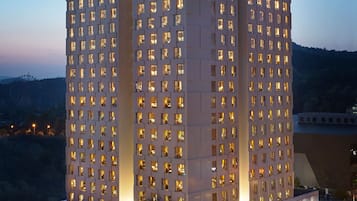
LOTTE City Hotel Daejeon
LOTTE City Hotel Daejeon
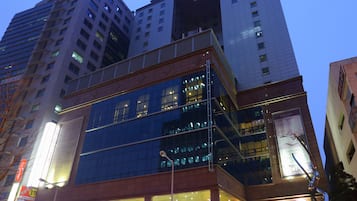
Toyoko Inn Daejeon Government Complex
Toyoko Inn Daejeon Government Complex
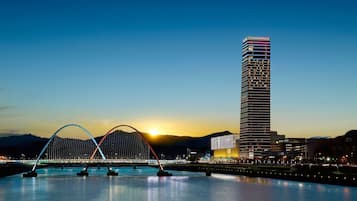
Hotel Onoma Daejeon, Autograph Collection
Hotel Onoma Daejeon, Autograph Collection
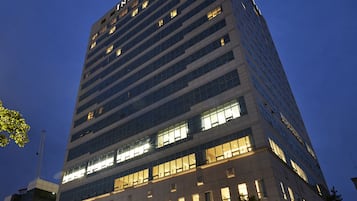
Hotel Interciti
Hotel Interciti
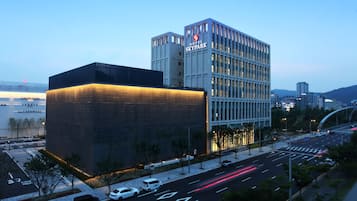
Hotel Skypark Daejeon 1
Hotel Skypark Daejeon 1

Hotel Stendhal
Hotel Stendhal

Hotel Primo
Hotel Primo
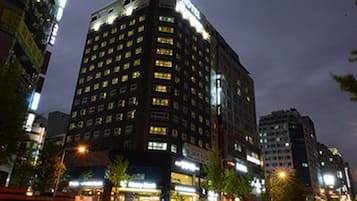
Hotel Graytone Dunsan
Hotel Graytone Dunsan
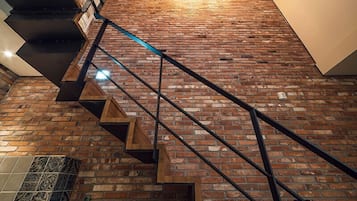
Hotel March
Hotel March
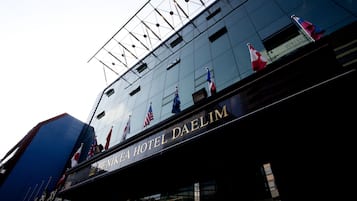
Benikea Hotel Daelim
Benikea Hotel Daelim
Σχετικά άρθρα
- Daejeon Travel Essentials

Daejeon Travel Essentials
South Korea - 5 Great Restaurants in Daejeon

5 Great Restaurants in Daejeon
South Korea - 5 Best Things to Do in Daejeon on a Small Budget

5 Best Things to Do in Daejeon on a Small Budget
South Korea - 7 Best Places to Go Shopping in Daejeon
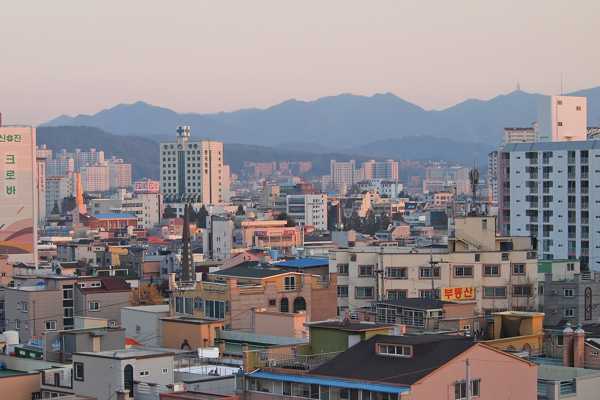
7 Best Places to Go Shopping in Daejeon
South Korea - 10 Best Local South Korean Foods to Try in Daejeon

10 Best Local South Korean Foods to Try in Daejeon
South Korea - 7 Places Where Locals Love to Eat in Daejeon

7 Places Where Locals Love to Eat in Daejeon
South Korea - 10 Best Things to Do After Dinner in Daejeon

10 Best Things to Do After Dinner in Daejeon
South Korea - 5 Best Bars in Daejeon

5 Best Bars in Daejeon
South Korea
